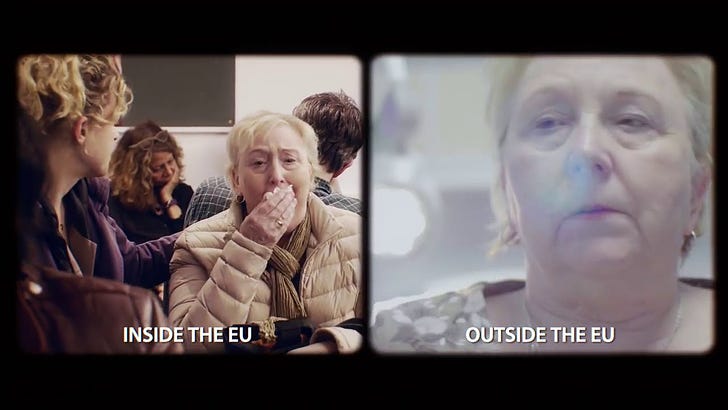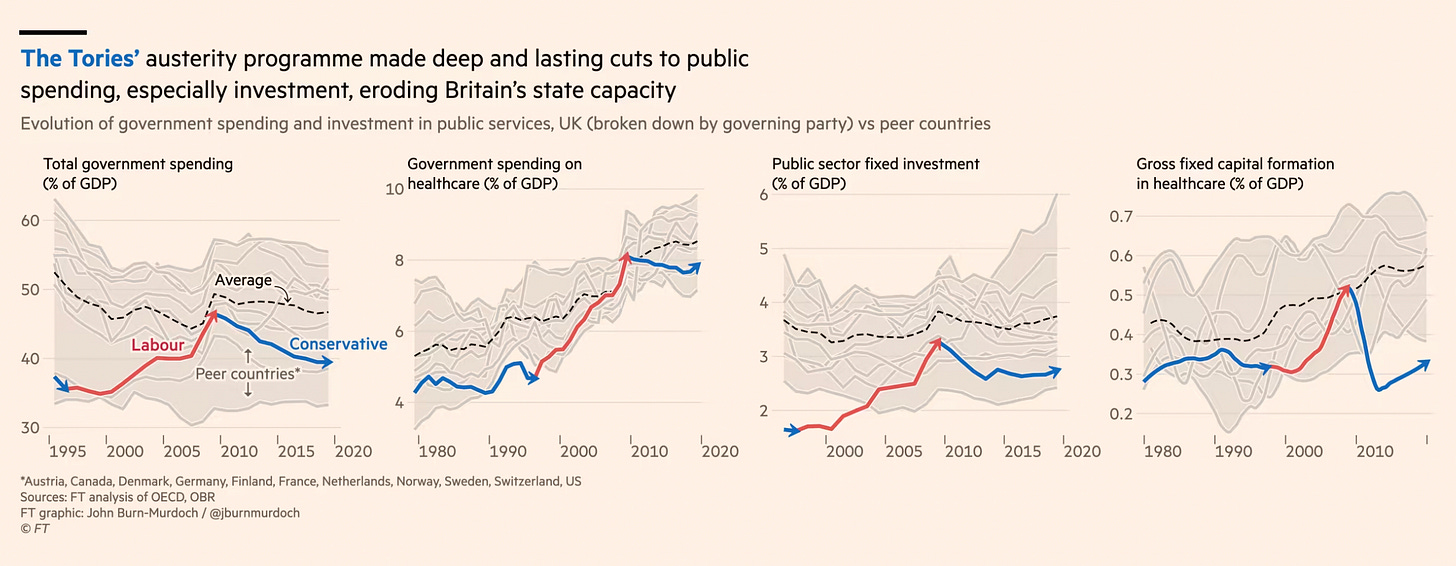Our politicians are in the business of creating fake realities. Using these convenient fictions, they then present us with fake choices. These fake choices often are formulated as dilemmas between things that are not real, influence our voting behavior and our political preferences.
Here I will discuss three such false dilemmas:
Brexit paradise or continued austerity
Business as usual or save the planet
Protect the vulnerable or save the economy
These are not choices between authentic options. And so the choice we make (as voters, as people who constitute the public sphere) are not real informed choices either.
As Spinoza writes in the Ethics (1677), if your views are based on inadequate ideas , you will become subject to emotions that will hold you in their grip. Those emotions will make you unfree. You are not able to make a rational choice, because the ground for your choice is not real.
Fake choice 1: Brexit paradise or continued austerity (Vote Leave, 2016)
In 2016 when I lived and worked in Oxford, the United Kingdom held a referendum on their membership of EU. The vote went Leave. This was expected, given how Leave presented voters with a fake, unrealizable picture. Their fake choice was as follows: Either we stay into the perpetual misery of a Britain that is ruled by austerity measures, or we go to Brexit paradise where all will be well. The Remain side presented no positives, only a picture of bleakness should Brexit materialize (this picture, ironically branded “project fear” by its opponents has largely come true).
In Brexit paradise, immigration would be drastically reduced (it has since dramatically increased), people's take home pay would increase (it has since shrunk), and the NHS would receive 350 million pounds a week, a redirected EU membership fee the UK was allegedly paying “Brussels.” Meanwhile in 2024, the NHS is on the brink of collapse due to covid, worker shortages, and chronic underfunding. None of the Brexit fairy tales came true.
To get a sense of how insidious this shaping of make-believe goes, here's a video of the Vote Leave campaign showing in split screen how great your experience going to the emergency room would be, if only you voted Leave:
This video demonstrates why voters bought into Brexit. Their reality in 2016 was not great. Since 2008, the United Kingdom's successive governments had led an unrelenting austerity campaign. They cut NHS funding to the bone, increasing waiting times and reducing services. They closed public places that helped promote people's connectedness and wellbeing, such as libraries, children's centers, and youth centers. This onslaught of austerity was already palpable in 2016. The harder a region was hit by austerity, the more it was likely to vote Brexit, that is, to vote for the fake vision of Brexit paradise. If austerity had not happened, Leave support might have been 10% lower (based on these calculations), and Remain would have won by a sizable margin.
Here is a helpful image from the Financial Times to show the damage well before Brexit was implemented in 2019.
Fake choices run into reality though. Britain's leaders continued fantasizing about hard, soft, half-baked, etc Brexit deals but the reality became: the more the UK divorces itself from the EU, the more the economic damage will be.
Brexit was presented as an easy and alluring solution to a self-created problem. Now, in 2024, the UK must chart a path and deal with reality. Or it can continue its slow descent into dysfunctional state, following the likes of Argentina or Turkey. The ease of the fakery of Vote Leave now exposed for the lie it is, all that remains for the UK is a bitter, long, tortuous negotiation path to carve out a relationship with its closest trading partners, and no easy solutions in sight.
Fake choice 2: Save the planet or the economy
For a collaborative project on how natural scientists see value, science, and religion, I interviewed 35 scientists. The most striking answers came from climate scientists, particularly one individual, “Jim,” who has been in this discipline for about two decades. As he put the choice governments face:
We’re facing a threat to the way we’re living. And there’s no cost of climate change. There’s a cost of doing nothing. And that cost is a lot bigger than the cost of taking action on climate change. So, we’re not faced with doing nothing and doing business as usual or taking action on climate change and saving the planet. The only two options that we have is kick the can down the road and making the problem a lot bigger and more expensive, or investing now…. I think we should fight for every half degree that we can. We should fight for every little bit that we can do.
Jim went on that climate change is often presented as something that affects only nonhuman animals, such as polar bears adrift on pieces of ice. But the message should not so much be “save the polar bears” but “save ourselves.” Reflecting on our conversation and the sheer bleakness of it. I sometimes think back of Jim's quietly agonized face as he told us, “I want to stand on a roof and scream at people that we have to do something, we have to stop doing what we’re doing, but of course that wouldn’t help too much.”
But what stuck with me most with this interview is that eventually we must do something or society will break down. The only question that remains is whether we do it now or later. Already the cost of climate change for the US alone is 150 billion a year, and it will get worse. The taxpayer bears the costs. Our governments are strewing sand in our eyes so we think that the options are business as usual or save cute polar bears and pandas.
Whereas it's clear: We cannot go on doing business as usual. Saving the planet is not some sort of fun side project or side quest we can do at our leisure. Moreover, we've already harmed the planet. As Jim told us, tipping points are real but it's not like if we cross a few that we can throw our hands up in the air and say “Okay, that's it, we missed our target.” No, it will just get worse and worse.
Fake choice 3: Protect the vulnerable or save the economy
Differently put, to save the economy, we must (unfortunately) throw the vulnerable under the bus. Let them fall “by the wayside.” It's regrettable. We shed crocodile tears, but it's inevitable.
It's 2024, three years after the vulnerable have been sacrificed for our collective greater good. The economy, dear reader, has not been saved.
Consider the data. Everywhere you look, hospitals are on the brink of collapse (good overview article by
here).The workforce globally is showing clear signs of distress because so many people are long-term ill. In Belgium early this year, blue-collar workers’ long-term illness stood at a record 16% and white-collar people on long-term leave “only” at 7.7%. Employers in Belgium are “begging” for foreign workers to fill the gaps. Even though it is politically difficult (far-right is projected to become the biggest part in Flanders in the next election), the number of foreign workers of non-EU origin has risen by 170% from 2019 to 2023. None of the articles I just mentioned directly cites covid and covid-related worker illness as a cause. Not even in Germany, which experienced a recession as a direct result of worker illness, do we see the link made.
Inflation remains stubbornly high because worker shortages give workers more bargaining power for better wages, an effect similar to the seismic societal shifts that the Great Plague wrought in the later middle ages.
There is a lot of bad news coming out on covid and the brain. Covid infections impair our cognitive function, sometimes at least a year after infection, including in vaccinated individuals. There are disturbing reports of things that may, or may not be, related: higher incidents of human errors in plane construction, road rage, car accidents, lower standardized test scores in children in spite of schools being reopened now for several years… It is bad news all around.
Speaking of schools, schools are experiencing acute worker shortages and record levels of absence. Teachers keep on getting sick. In the Netherlands, where homeschooling is not permitted, many schools now pivot to four-days-a-week school because they cannot find enough teachers.
The most commonly cited reason for why kids are absent is illness. Parents do not keep children at home because they want to go on holiday with them. Parents need children to be in school so they can go to work. Keeping your child home (I can attest, as a working parent) is a last resort.
Instead of trying to do something about this, our governments come up with brilliant campaigns like these:
I feel for this boy being forced into school while he's feeling ill. I feel for us all being sacrificed. It's not just the vulnerable. Or it is, because we're all vulnerable.
Once again we are presented with a fake choice: Protect the vulnerable or save the economy.
Or, business as usual or “restrictive” covid measures.
The problem is, analogous to Jim's observations about climate, that this is not our choice to make. We cannot will business as usual into existence by social fiat. How can we over time withstand this repeat infection and assault on people’s mental functioning and wellbeing? It is not sustainable. The choice is not between fake-pretend-repeat illness new normal and restrictive covid measures, but between doing something now, while damage is already considerable, or waiting to do it later as our economies will collapse under our repeat infections. We cannot do modern economy with modern infrastructure while having the public health of the 18th century where you, your children, and your aging parents can be struck by disease and die at any moment.
In conclusion
I started out with Spinoza's remarks that you cannot act freely but only in a compelled manner (which he compares to slavery) if you do not work with adequate ideas. If governments hold up these false ideas, these comfortable illusions of Brexit fairytales and wishing pandemics away, then we cannot as voters and as informed citizens act. Then we are victims to their agendas. We cannot let this happen. We must look reality clearly, calmly and soberly in the eye.






I've seen my friends use this tactic all the time with their children to get them to pick option A or B, both things the parents want. It's funny even as adults we miss that there are so many other options of only we would think about it a bit more.
Great post, it is a sad situation indeed.
Something interesting I've noticed in my time here on Earth: we have something like 7 billion++ humans (and human brains) at our disposal, with most of them networked via the internet, and yet we only use <<< 1% of these brains to solve our many problems.
Now if this was a sitcom or something this would be pure hilarity, but since this seems to be the real deal, it is more so horrific (though, still hilarious imho).
What should one do if one finds oneself awakening into a situation where one is trapped on a planet in the middle of this situation?